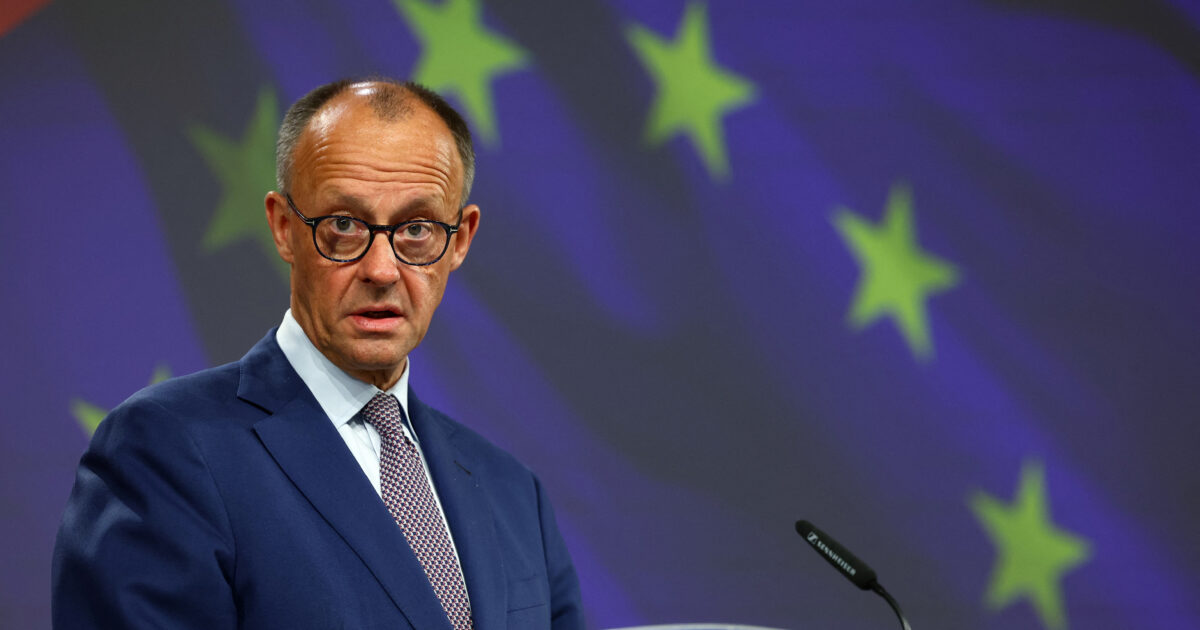Only with the EU (ed. And not individually with each member of the separately) can the US be negotiated, according to what it said (addressed to the Trump) Today from Brussels, the new Chancellor of Germany, Friedrich Mertz.
Speaking to reporters on Friday (9.5.2025) during his first visit to Brussels after his election as a Chancellor in Berlin earlier this week, Friedrich Mertz said Trump congratulated the recent conclusion of the EU. EU member states.
“But I explained to him that this would not be possible with other European nations who are members of the European Union, because we can and do want to act only in commercial issues,” Merz said during a press conference with European Council President Antonio Costa.
Mertz said he had the impression that Trump had understood and accepted this event during their first telephone communication late Thursday (8.5.2025). “I told him that from my view it is not a good idea to escalate this commercial dispute,” Mertz said. “My strong belief is – zero duties would be the best.”
Later, Mertz will also meet with Commission President Ursula von der Laien and NATO Secretary -General Mark Rutte. The 69 -year -old Mertz has pledged that Germany would play a more active role within the EU and seek closer cooperation with its international partners. Trump has targeted the EU as part of his broader effort to remodel global trade and has been offered to negotiate with major commercial partners following the announcement of sharp duties in early April.
While the United Kingdom has announced this week that it has reached an agreement with the US to reduce some of Trump’s duties, efforts to prevent escalation of trade disputes have made little progress so far in the EU. The EU plans to hit US $ 108. end up in a satisfactory result.
Suggested retaliation measures will target industrial products, including Boeing aircraft of American -made cars and Burbon, which had initially been removed from a previous directory. The new proposal will be subject to consultations with Member States and other stakeholders by June 10 and may be changed before it is finalized.
The European Commission, the executive arm of the bloc, which handles commercial issues, is launching negotiations with the US government this week and still seeks to find a friendly solution to Trump’s pressure on tariffs.
Commission officials are expected to present to Washington a menu of options – including ideas for reducing commercial and non -tariff barriers and boosting investment in America – that could be converted into formal proposals.
Not to the common European borrowing
Mertz conquered speculation that he could support more common European lending, which has been put in a way for EU Member States to fund more defense spending in the light of tight national budgets.
“I will not change the German government’s position on the European Union’s borrowing capabilities, this must remain an exception,” Mertz told reporters. “There have been exceptions in the past, but now we have to deal with and face crises and difficult situations for a longer period. This cannot be perceived as a permanent excuse for additional European debt. “
Mertz said discussions between EU Member States on more common European lending would continue and that opinions are diverting on the issue, adding that France and Germany are not on the same page on debt issue.
Mers warns of the dangers of the weight gain of national debt in many parts of the world. “I am already worried about the ever -increasing national debt around the world, not only in Europe but also in America, for example,” the CDU leader said on Friday in Brussels.
“I am already wondering how long it will be possible to refinance not only debt itself but also interest. We cannot be charged indefinitely, “he warned.
Mers wants to abolish the supply chain law
Mers presented one of these new ideas on Friday. It calls on the EU’s institutions to abolish the European Supply Chain Directive. “We will abolish national law in Germany. I also expect the European Union to follow our example and truly abolish this directive, “the CDU politician said at a joint press conference with European Commission President Ursula von der Laien.
He welcomed the fact that the European Commission wants to systematically reduce bureaucracy. The German government will support this. “We will also submit suggestions on how we can go further,” Merts said.
In addition to postponing the legislation, the next logical step would be the complete abolition of certain European rules. The European supply chain act was voted just last year.
Its aim is to strengthen human rights worldwide. Big companies are going to be accountable if they benefit from human rights violations, such as child or forced labor. The first provisions of the Directive will be applied in 2028.
The Deputy Chief of the Party and Greens spokesman for Europe, Sven Giegold, believes that Merts’ request contrasts with the Coalition Agreement. “His imposing tone to Ursula von der Laien is alarming,” Giegold said.
Page 60 of the Coalition Agreement between the SPD and the CDU – CSU states that the German supply chain law will be replaced by a law on international corporate responsibility “implementing the European Supply Chain Directive (CSDDD) with minimal bureaucracy and in a friendly implementation”.
